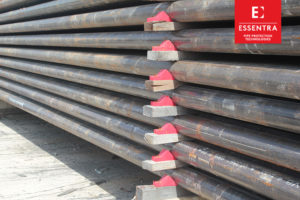OCTG (oil country tubular goods) refers to a collection of rolled metal products, more commonly known as pipes, and the various accessories included. This can consist of drill, casing or tubing pipes, thread protectors, stabbing guides, bumper rings, and pipe chocks.
OCTG Products
For the purpose of this educational blog, we will be discussing pipes, as they are the most crucial part of OCTG as a whole. The piping products qualify as OCTG due to the specifications of each pipe in regard to their acceptable loading conditions, what they can transfer, how strong they are, and their composition.
Drill pipe refers to the heavy tubes, usually seamless, used in the rotation of the drill bit and the drilling fluid, which can be joined together using tool joints. The pipe is subject to axial tension (due to its own dead weight while in use), high internal pressure (due to the exhaust of drilling fluid), and extremely high torque (due to actual drilling and turning of the drill bit). In other words, drill pipes are heavy-duty, extremely strong, and crucial in any OCTG endeavor.
Casing Pipes
Casing pipe is used to line the borehole, which is the hole dug into the ground to get to the oil. Like the drill pipe, it, too, is subject to axial tension. However, it differs in that while it needs to handle internal pressure from the oil itself, there is also external pressure from the rock and sediment it has been bored into. It is extremely heavy-duty and crucial to OCTG.
Tubing Pipes
Tubing pipes go inside casing pipes. This is the pipe that the oil itself will eventually make its way out of. The most simplistic of the OCTG family, tubing pipes can usually be found in segments of about 9m (30 ft), with threaded connections on each end, which can be protected with drill pipe protectors during transportation and storage. These protectors also help protect against any corrosion that could happen during storage, which could cause significant problems when tons of oil are being pumped through.
The OCTG Manufacturing Process
Typically, OCTG manufacturing processes include continuous mandrel-rolling and push bench processes for tubular goods between 21 and 178 mm OD. Plug mill rolling is used for sizes anywhere from 140 to 406 mm OD; for those found between 250 and 660 mm OD, cross-roll piercing and pilger rolling processes are used.
These processes usually don’t include the thermo-mechanical processes traditionally used for the strip and plate products, the kind that you might find on welded pipes. To compensate, heavy-duty, high-strength seamless pipe is manufactured by increasing the alloy content in combination with a heating treatment, such as quench and temper, to help further strengthen the pipe.
As you might imagine, oil country tubular goods have a base standard requirement of extremely dependable hardness, usually referred to as having a martensitic structure (super hard). To meet these standards, Chromium and manganese are used as the primary alloys to help confirm high cohesion and durability. The main issue that arises is sulfide stress cracking, which comes from actual drilling into the deep earth. Not only is the pressure immense at those levels, but the drilling itself causes the creation of particles that quicken corrosion.
To combat this, recent developments have been made where alloys are blended with Molybdenum, an element that can help overcome the limitations of Manganese and Chromium. Traditional levels have seen an inclusion of molybdenum at about .4%, while newer techniques have produced levels closer to .75%, which is now the more desirable combination.
Pipe Protection with MSI
Engineered with precision and built for performance, MSI delivers unparalleled reliability, ensuring your pipes are shielded from the harshest elements. Don’t compromise on the integrity of your pipelines – choose MSI for unrivaled quality and peace of mind. Explore our comprehensive range of innovative pipe protection solutions today and fortify your assets for a resilient future.




